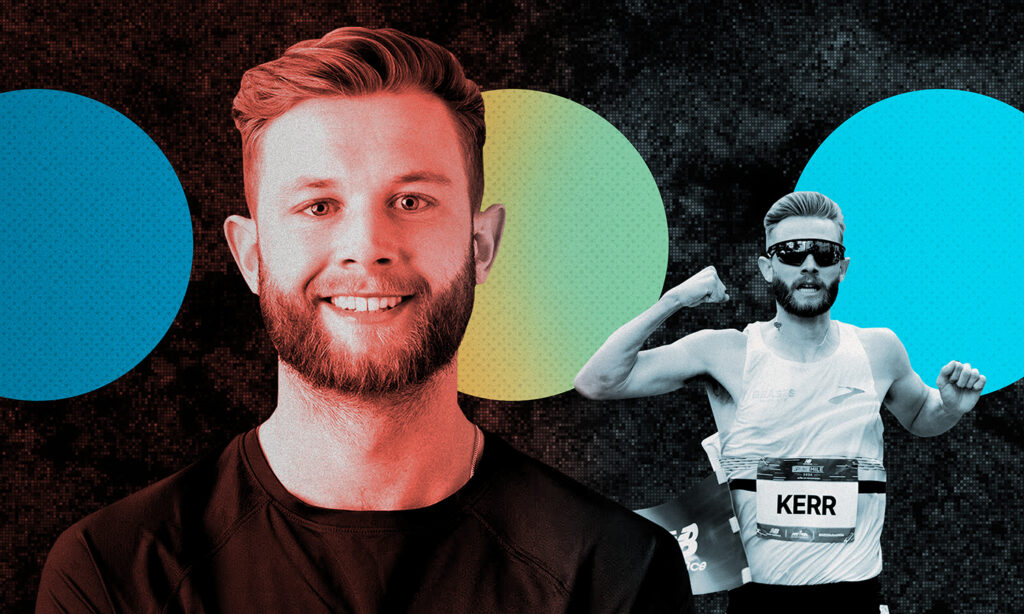AMAM: So many of the running special insiders are gathered here this week to help map out the retail side of 2025, but what brings you here?
JOSH KERR: So for us, when you’re working with a shoe company, it’s always like, ‘Ok, we want to use you for some appearances,’ stuff like that. And my question is always the same, which is, where can we come where we can have a big impact and try and help the brand and show off as much as we can about the really cool products that we’re able to have?
AMAM: How do you feel about what’s coming next in the pipeline to keep athletes like you supported on the performance level?
KERR: When I first signed with the company, and when Brooks Beasts kind of first started maybe 12 years ago, it was maybe not as performance-based as it is now.
And so now the production team does such an amazing job with the trust that we have in them. We know that year-on-year they’re going to create fantastic products and they have the funding from Brooks to do so. We’re involved with it every step of the way. So I never wonder what’s coming out next. There’s some really fun, fast products coming out from our perspective, like spikes and flats.
AMAM: And what were your thoughts about closing out year with a big win at the 5th Avenue Mile in September?
KERR: At this point, I don’t like losing in New York. I go there to win, go there to break records and I was able to continue to do that. And so that’s what I love to do, and that’s what they pay me to do out there.
AMAM: And on the horizon you have like Grand Slam Track coming in 2025.
KERR: I know it’s the change that the sport needs and that’s going to cause some upsets from people. But I do think getting in on the ground level is going to be smart, because this is going to change the whole value of the sport — the whole value of the athlete, specifically.
AMAM: Really? Explain.
KERR: I’ve really enjoyed the process so far. They’ve treated us like professional athletes for probably the first time in our career from a racing perspective. And we’re going to put performances on that is going to show that’s why we should be supported like that.
AMAM: And it comes with the increase in prize money for athletes.
KERR: Yeah, I think this sport is one of the oldest sports in the world and we’re just not getting shown on prime time television. So it’s difficult to get the money to the athletes. So that’s what needs to be fought for — is for the casual fans to be changed into a full time fan that knows ins and outs of the sport.
AMAM: And that’s achievable?
KERR: You know, there’s a lot of sports in the U.S. that are doing extremely well that are a lot more boring to watch than track and field. I’ll tell you that for a fact. Coming from the UK, I can’t sit through a lot of the sports here. But I’ll tell you what — they’re making a lot more money than we are.
So evidently, they’re doing a great job marketing, they’re doing a great job showing off their brands. For us, it’s time to create the value and make sure that we’re putting on the performances. Make sure that people are sitting there watching and having fun.
AMAM: The last time we spoke in New York you talked about when you get asked questions, you said if people asked you good questions, you’d give them good answers. What is the importance of quality storytelling?
KERR: Look, the reason the sport is where it’s at is not because just the media, it’s not just because of the race, it’s not just because of the athletes. It’s kind of everyone. Everyone needs to step up. And if we’re putting together hard work and putting the performances on a weekly basis, bi-weekly basis, then we’ve got to show character, too.
We’ve got to show the storylines that align with what we’re doing. And for us, not answering a question — yes or no — maybe giving some insight from a personal media standpoint and making sure people have stories to hold onto. So when we’re standing on a start line, they’re like, ‘OK, this is this guy. This is what he’s about.’
AMAM: It sounds like a concept the sport need to finally commit to.
KERR: That’s our responsibility and the media’s responsibility to put some research in and ask questions that people care about, to write stories that people care about. Something that’s not hit pieces.
I’m going to put the time and effort in my job and make sure that we’re bringing out the media that people want to read.
AMAM: This year is just about done, so what are you looking forward to for 2025?
KERR: There’s lots to look forward to, like Grand Slam track. I’ve got two world titles to retain this year. And I’m going to do it with some pretty fast Brooks on my feet.

